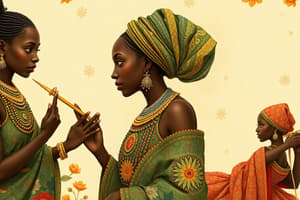Podcast
Questions and Answers
What is the setting for Act One according to the stage directions?
What is the setting for Act One according to the stage directions?
- A mountain
- A palace
- A grove (correct)
- A forest
What is the significance of the Olubori rites in the context of the story?
What is the significance of the Olubori rites in the context of the story?
- They are rituals to heal a sick king
- They are rituals to crown a new king
- They are rituals to make a mortal king immortal (correct)
- They are rituals to honor the god of iron and war
Why does Serubawon believe the ailing king, Akinjobi, should be replaced?
Why does Serubawon believe the ailing king, Akinjobi, should be replaced?
- Because Akinjobi is weakened by sickness and cannot perform his duties (correct)
- Because Akinjobi is not a friend of Serubawon
- Because Akinjobi is not a good leader
- Because Akinjobi is no longer popular with the people
What is the meaning of Serubawon's phrase 'Akinjobi dies slowly...'?
What is the meaning of Serubawon's phrase 'Akinjobi dies slowly...'?
What is the nature of the relationship between Serubawon and the ailing king, Akinjobi?
What is the nature of the relationship between Serubawon and the ailing king, Akinjobi?
What does Serubawon's statement 'our culture knows no stagnation' imply?
What does Serubawon's statement 'our culture knows no stagnation' imply?
According to Odejimi, what is essential for the emergence of a new king?
According to Odejimi, what is essential for the emergence of a new king?
Why does Serubawon think Ajanaku's sons are not suitable for kingship?
Why does Serubawon think Ajanaku's sons are not suitable for kingship?
What is the council's role in the selection of a new king?
What is the council's role in the selection of a new king?
What does Odejimi argue that the Yoruba culture and civilisation are based on?
What does Odejimi argue that the Yoruba culture and civilisation are based on?
Flashcards are hidden until you start studying
Study Notes
Setting
- The scene takes place in a grove, with the sounds of a gong and chants of Ogun, the god of iron and war in the Yoruba pantheon, in the background.
Characters
- Ajanaku: the tyrant King, seated on a stool, bare-chested, and interested in becoming the king despite the real king being alive.
- Odejimi and Ogundele: two elderly men who stand by Ajanaku's side, uncomfortable with the rituals performed on the young king.
- Serubawon: a bare-chested performer who conducts the rites, interested in the gifts Ajanaku brings, and believes the real king, Akinjobi, is weakened by sickness and unable to perform his duties.
- Akinjobi: the real king, alive but sick, and a friend and patient of Serubawon.
Plot
- The Olubori rites, to turn a mortal into an immortal, are performed on Ajanaku, making Odejimi and Ogundele uneasy.
- Serubawon claims to have done everything to make Akinjobi well but without success, and believes Akinjobi is dying slowly.
- Ogundele emphasizes that the living king, Akinjobi, is sick but not insane and should still be recognized as king, according to custom.
- Serubawon uses euphemism to refer to Akinjobi's impending death, comparing his life to a sun setting in the sky.
- The theme of cultural appropriation is introduced, as Serubawon justifies letting Akinjobi die while preparing Ajanaku to take his place, citing that their culture knows no stagnation.
Conflict
- Odejimi argues that the Yoruba culture and civilization rest on order and structure, and that due process should be followed in the emergence of a new king.
- Ogundele adds that there are siblings who senior Ajanaku, and that the council should perform its duty in selecting a new king.
- Serubawon counters, stating that the Hunters are the king makers, and that Ajanaku's gifts and favours to them in the past justify his claim to the throne.
- Odejimi insists that Akinjobi has worthier sons who could be kings, and that the assistance Ajanaku has given them is not enough reason to subvert the process of king making.
Studying That Suits You
Use AI to generate personalized quizzes and flashcards to suit your learning preferences.




